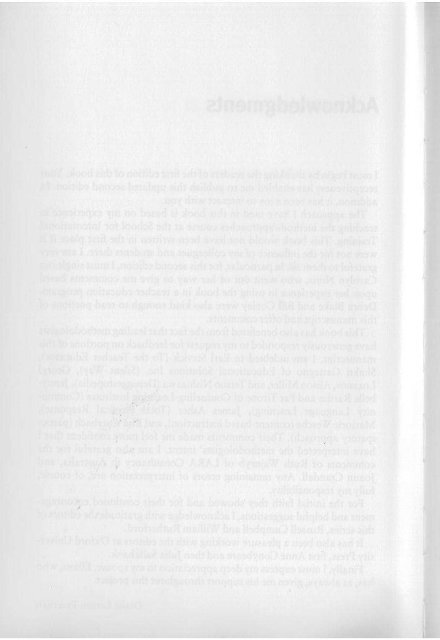Diane Larsen-Freeman
larsen-freeman-techniques-and-principles-in-language-teaching
larsen-freeman-techniques-and-principles-in-language-teaching
- No tags were found...
Create successful ePaper yourself
Turn your PDF publications into a flip-book with our unique Google optimized e-Paper software.
To the Teacher Educator<br />
ON LANGUAGE TEACHING METHODS AND THEIR USE<br />
IN TEACHER EDUCATION<br />
A study of methods is invaluable in teac her education in at least five ways:<br />
1 Met hods serve as a foil for reflection that can aid teachers in bringing<br />
to conscious awareness the thinking that underlies their actions. We<br />
know t hat teachers come to teacher training with ideas about the<br />
teac hing/learning process for med fro m the years they have spent as student<br />
s themselves (I.ortie 1975). A major purpose of teacher educa tion<br />
is to help teac hers mak e the tacit explicit (Shulman 1987; <strong>Freeman</strong><br />
1991 ). Wh en teac hers a rc exposed to methods an d asked to reflect on<br />
their principles and actively engage with the ir techniques, they can<br />
beco me clearer about why they do what they do. They become aware<br />
of their own fun damental assumptions, values, and beliefs.<br />
2 By beco ming clear on wh ere they stand, teachers can choose to teac h<br />
differently from t he way they were ta ught. They are a ble to see wh y<br />
they are attracted to certain meth ods an d repell ed by others. They a rc<br />
able to make choices that arc informed, not cond itioned. They may be<br />
able to resist, or at least argue aga inst, the imposition of a pa rticular<br />
method by authorities. In ot her situations , where a method is not<br />
imposed, methods offer teachers alte rnatives to wha t they currently<br />
think and do . It do es not necessarily follow th at teachers will choose to<br />
modify their current practice. T he point is that they will have the<br />
understandi ng to do so, if they are able to and wan t to.<br />
3 A knowledge of met hods is part of th e knowledge base of teac hing.<br />
With it, teachers join a community of pra ctice (<strong>Freeman</strong> 1( 92). Being a<br />
community member entai ls learn ing the pro fessiona l discourse that cornmunity<br />
mem bers use so that professiona l dialog ca n take place. Being<br />
pa rt of a discourse community confers a professional identity and connects<br />
teachers with others so they are not so isola ted in their practice.<br />
4 A professiona l discourse community may also challenge teachers' con <br />
ceptions of how teachin g leads to learn ing. Interacting wit h others'


